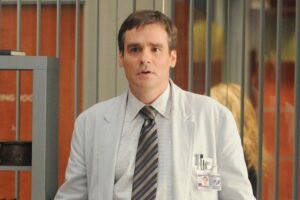1. “We diagnose diseases, but never forget—patients are humans, not just symptoms.”
2. “Compassion is as essential as any scalpel in this line of work.”
3. “Always question House, but never doubt yourself.”
4. “Underneath the sarcasm, there’s always a chance to heal.”
5. “Hope is the best medicine, even in the darkest halls of this hospital.”
6. “You don’t solve a case by forgetting there’s a heart behind every diagnosis.”
7. “Humanity first, treatment second.”
8. “Facts and empathy—both are crucial to saving lives.”
9. “Medicine is a puzzle, but every piece is someone’s life story.”
10. “House teaches us skepticism; I teach us warmth.”
11. “Sometimes the right diagnosis begins with the wrong assumptions.”
12. “In our quest for answers, compassion shouldn’t be collateral damage.”
13. “Treat with care, both disease and the person.”
14. “A cure isn’t complete until the patient understands their journey.”
15. “Listening can be as powerful as any prescription.”
16. “Boundaries in medicine are necessary, but empathy has none.”
17. “House challenges the rules, I remind us why they exist.”
18. “Emotions are not a diagnosis, they’re human experience.”
19. “A medical mystery is never solved without seeing the human beneath it.”
20. “Hopeful doubt can lead to the right answers.”
21. “Never let cynicism eclipse care.”
22. “In medicine, healing the heart isn’t just a metaphor.”
23. “Clinical detachment isn’t the absence of empathy.”
24. “Detail is everything, in life and in labs.”
25. “A second opinion is sometimes just listening to the heart first.”
26. “Being a doctor means treating both visible and invisible scars.”
27. “House’s chaos is sometimes the only road to clarity.”
28. “Understanding a diagnosis means understanding the person.”
29. “Sympathy isn’t a weakness; it’s our silent strength.”
30. “Never lose sight of humanity beneath the microscope.”
31. “In seeking cures, we mustn’t forget kindness.”
32. “Medicine without humanity leaves us with empty victories.”
33. “Empathy costs nothing but gives everything in return.”
34. “The greatest mystery is often why we forget to care.”
35. “The best doctors treat diseases; the greatest doctors heal lives.”
36. “Given all the science, never underestimate the power of a gentle word.”
37. “You can doubt the charts but never doubt their struggle.”
38. “Always find time for compassion amidst the chaos.”
39. “Even House’s bravado needs to be countered by gentleness.”
40. “Puzzles are solved in the brain, but the heart makes them human.”
41. “Our biggest strength is our ability to connect.”
42. “Let empathy be the first and last prescription.”
43. “Behind every diagnosis is a story waiting to be heard.”
44. “Healing is in the details, as much as in the cure.”
45. “A doctor cures the mind as much as the body.”
46. “The challenge is to solve the mystery while honoring the human.”
47. “In pursuit of the answer, don’t ignore the question it was born from.”
48. “Doubt fuels diagnosis, but compassion fuels healing.”
49. “Healing isn’t just a process; it’s a purpose.”
50. “Remember, every patient you treat is someone’s whole world.”
The Enigmatic Dr. Allison Cameron: Unpacking Popular Fan Theories
Dr. Allison Cameron, one of the most intriguing characters from the critically acclaimed TV series Dr. House, has inspired a multitude of fan theories over the years. Her complexity, combined with her moral integrity and vulnerability, has sparked debates and speculation within the fan community. Let’s delve into some of the most captivating theories surrounding her character, offering fresh insights into her enigmatic persona.
The Theory of Unresolved Trauma
A prevailing theory suggests that Dr. Cameron’s deep empathy and sometimes rigid moral compass might stem from unresolved trauma in her past. The series provides glimpses into her history, hinting at losses and struggles that she faced at a young age. Fans theorize that these experiences may drive her relentless pursuit of perfection and empathy, almost as a way to self-medicate and fill an emotional void. This theory provides a lens through which viewers can interpret her actions, especially her stringent ethical views, as mechanisms to exert control over her complex emotions.
The “Underlying Romantic” Theory
Some fans assert that Cameron’s interactions with Dr. Gregory House reveal a romantic undercurrent that she consistently navigates throughout the series. While her professional admiration for House is evident, supporters of this theory argue that her attempts to challenge and understand House on a deeper level indicate unspoken affection. This perspective suggests a classical trope of “opposites attract,” enriching the dynamic between the two characters beyond clinical procedures.
The Personal Growth Theory
Another popular theory highlights Cameron’s storyline as a portrayal of personal growth and self-discovery. Fans posit that her journey from an idealistic and emotionally-driven doctor to a more seasoned and pragmatic professional mirrors the trials and transformations that many individuals face in real life. This evolution can be viewed as Cameron stepping out of the shadows of her colleagues and past traumas to define her own path, making her narrative resonate deeply with audiences seeking authenticity and growth in their own lives.
The Symbol of Empathy
Dr. Cameron is often seen as the embodiment of empathy within the diagnostics team. A theory circulated by fans suggests that her role was deliberately designed to juxtapose the often-cynical environments and personalities around her. Through this lens, Cameron can be viewed as a moral compass within the hospital, not only challenging House and his methods but also offering viewers a necessary counterbalance to the otherwise stark pragmatism in the series.
In conclusion, the numerous fan theories surrounding Dr. Allison Cameron paint her as a multi-dimensional character whose depth continues to captivate audiences. Whether seen as a symbol of empathy or interpreted through the lens of personal trauma and growth, Cameron remains a seminal character whose narrative invites ongoing exploration and reflection.








